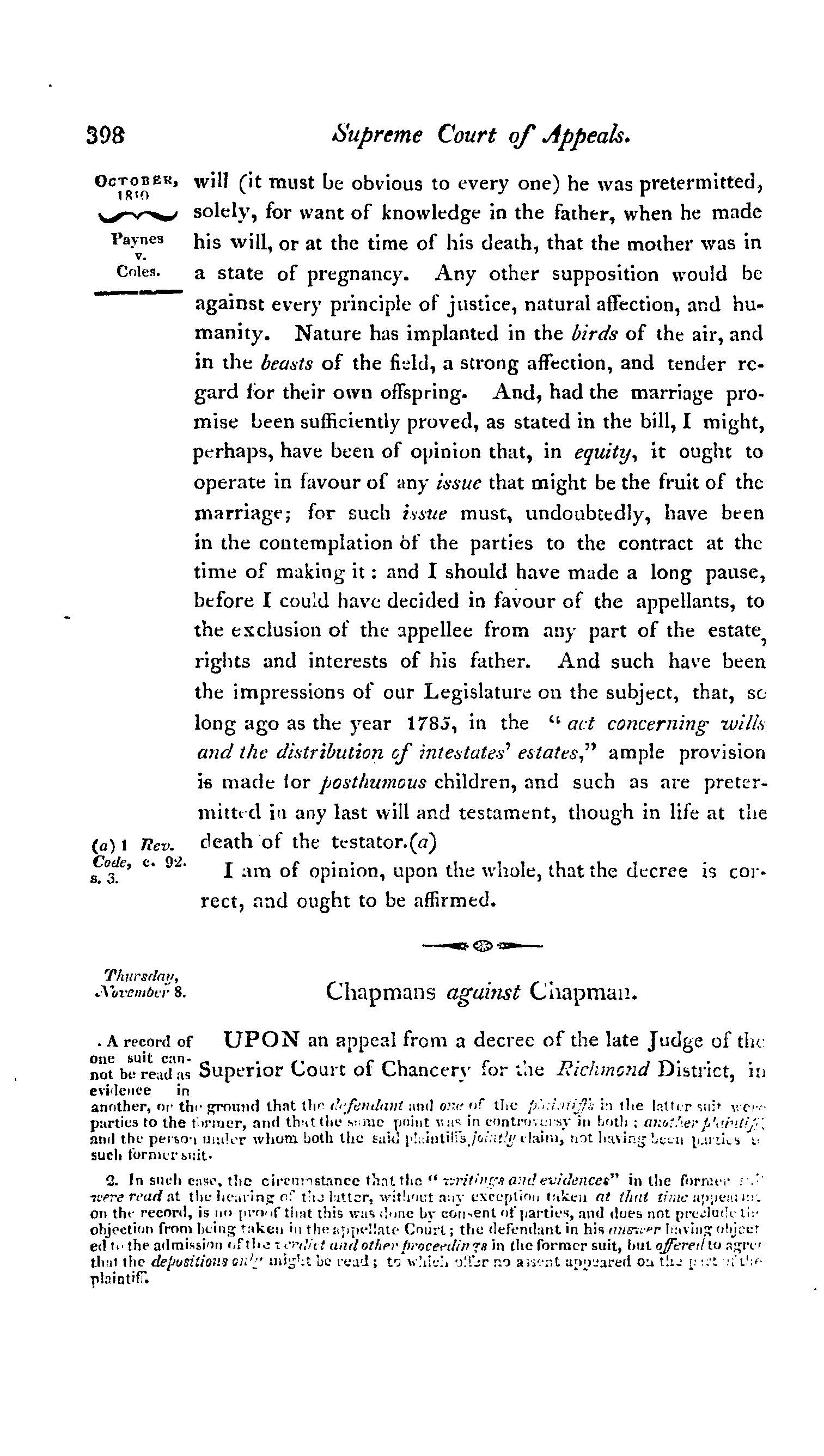Difference between revisions of "Chapmans v. Chapman"
From Wythepedia: The George Wythe Encyclopedia
Mvanwicklin (talk | contribs) m |
Mvanwicklin (talk | contribs) m |
||
| (2 intermediate revisions by the same user not shown) | |||
| Line 1: | Line 1: | ||
{{DISPLAYTITLE:''Chapmans v. Chapman''}} | {{DISPLAYTITLE:''Chapmans v. Chapman''}} | ||
| − | [[File:MunfordChapmansvChapman1854v1p398.jpg|link={{filepath:MunfordsReports1812V1ChapmansvChapman.pdf}}|thumb|right|300px|First page of the opinion [[Media:MunfordsReports1812V1ChapmansvChapman.pdf |''Ambler v. Wyld'']], in [http://wm-primo.hosted.exlibrisgroup.com/01COWM_WM:EVERYTHING:01COWM_WM_ALMA21560678820003196 ''Reports of Cases Argued and Determined in the Supreme Court of Appeals of Virginia'' | + | [[File:MunfordChapmansvChapman1854v1p398.jpg|link={{filepath:MunfordsReports1812V1ChapmansvChapman.pdf}}|thumb|right|300px|First page of the opinion [[Media:MunfordsReports1812V1ChapmansvChapman.pdf |''Ambler v. Wyld'']], in [http://wm-primo.hosted.exlibrisgroup.com/01COWM_WM:EVERYTHING:01COWM_WM_ALMA21560678820003196 ''Reports of Cases Argued and Determined in the Supreme Court of Appeals of Virginia''], by William Munford. New York: I. Riley, 1812.]] |
__NOTOC__ | __NOTOC__ | ||
[[Media:MunfordsReports1812V1ChapmansvChapman.pdf|''Chapmans v. Chapman'']], 15 Va. (1 Munf.) 398 (1810), <ref>William Munford, ''Reports of Cases Argued and Determined in the Supreme Court of Appeals of Virginia,'' (New York: I. Riley, 1812), 1:398.</ref> was family dispute involving the execution of a will. | [[Media:MunfordsReports1812V1ChapmansvChapman.pdf|''Chapmans v. Chapman'']], 15 Va. (1 Munf.) 398 (1810), <ref>William Munford, ''Reports of Cases Argued and Determined in the Supreme Court of Appeals of Virginia,'' (New York: I. Riley, 1812), 1:398.</ref> was family dispute involving the execution of a will. | ||
==Background== | ==Background== | ||
| − | Pearson Chapman was directed by his mother to have her will | + | Pearson Chapman was directed by his mother to have her will reauthenticated before additional witnesses. Pearson took a peek at the contents of the will and was angered to find his mother granted her entire estate his brother, George Chapman. Instead of having the will reauthenticated, Pearson destroyed it, keeping his mother's deeded property for himself. George sued Pearson for the will. Pearson retaliated by attempting to evict George through the High Court of Chancery. |
===The Court's Decision=== | ===The Court's Decision=== | ||
| Line 17: | Line 17: | ||
[[Category: Cases]] | [[Category: Cases]] | ||
| + | [[Category: Inheritance]] | ||
Latest revision as of 13:40, 30 July 2018

First page of the opinion Ambler v. Wyld, in Reports of Cases Argued and Determined in the Supreme Court of Appeals of Virginia, by William Munford. New York: I. Riley, 1812.
Chapmans v. Chapman, 15 Va. (1 Munf.) 398 (1810), [1] was family dispute involving the execution of a will.
Background
Pearson Chapman was directed by his mother to have her will reauthenticated before additional witnesses. Pearson took a peek at the contents of the will and was angered to find his mother granted her entire estate his brother, George Chapman. Instead of having the will reauthenticated, Pearson destroyed it, keeping his mother's deeded property for himself. George sued Pearson for the will. Pearson retaliated by attempting to evict George through the High Court of Chancery.
The Court's Decision
Chancellor Wythe dismissed the eviction action and granted the land to George Chapman and his heirs. The Court of Appeals unanimously affirmed.
See also
References
- ↑ William Munford, Reports of Cases Argued and Determined in the Supreme Court of Appeals of Virginia, (New York: I. Riley, 1812), 1:398.